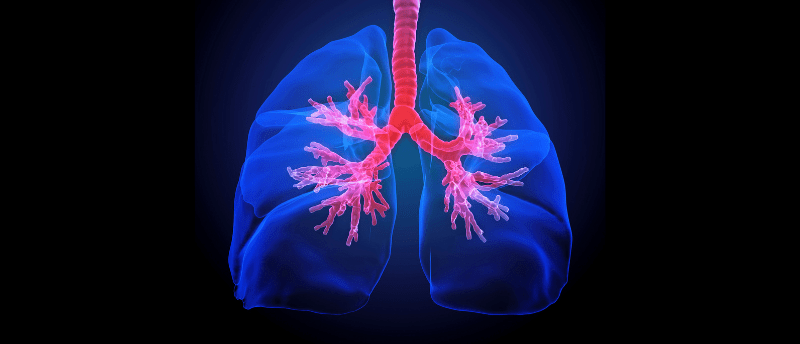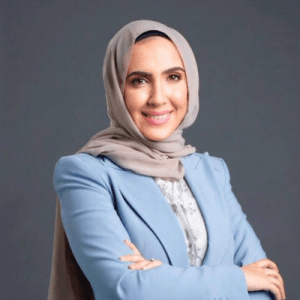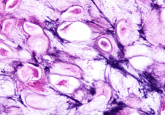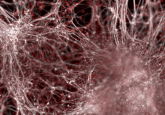Studying the relationship between fat cells and asthma

 Saba Al Heialy is an Associate Professor of immunology at the Mohammed Bin Rashid University of Medicine and Health Sciences (MBRU; Dubai, United Arab Emirates). Saba also holds an adjunct position at McGill University (Montreal, Canada), where she completed her PhD in 2013 under the supervision of James Martin in the Meakins-Christie Laboratories. Here, Saba discusses her research studying respiratory diseases and the value of awards recognizing and empowering women in science.
Saba Al Heialy is an Associate Professor of immunology at the Mohammed Bin Rashid University of Medicine and Health Sciences (MBRU; Dubai, United Arab Emirates). Saba also holds an adjunct position at McGill University (Montreal, Canada), where she completed her PhD in 2013 under the supervision of James Martin in the Meakins-Christie Laboratories. Here, Saba discusses her research studying respiratory diseases and the value of awards recognizing and empowering women in science.
What is the main focus of your research?
My training focused on the role of immune cells in the pathogenesis of asthma. In line with my training, my area of research today focuses on the association between asthma and obesity. Obesity and asthma are global health concerns with increasing incidence. Obesity is one of the main risk factors associated with asthma and asthma in obese patients is more severe and more difficult to treat. Therefore, my laboratory aims to understand the complex interrelationship between obesity and asthma.
What approaches do you use to study the link between asthma and obesity?
Since 2017, I have been interested in understanding the pathology of obese asthmatics. These patients are more difficult to treat and much remains to be understood about this association. My laboratory is currently working on understanding how obesity increases the symptoms of asthma and contributes to the pathogenesis of asthma. We are exploring the role of fat cells in the development of asthma using clinical samples and cell lines.
In what ways are the immune system and respiratory diseases linked?
The lungs are constantly being exposed to foreign substances. They are equipped with the necessary machinery to maintain equilibrium. The presence of immune cells within the respiratory system is essential to be able to respond to invasion by foreign pathogens while being tolerant of non-pathogenic substances. However, any disruption to the immune responses in the respiratory tract can have detrimental effects overall.
For example, asthma patients show increases in a subset of immune cells called the T lymphocytes, which orchestrate the immune response. Increases in the number of T lymphocytes within the airways can have detrimental effects on the overall health of the lungs.
Could you tell me more about your research on obesity and COVID-19?
When the pandemic started in 2020, the data quickly showed that obese patients were at increased risk of developing severe COVID-19 and hence an increased risk of death. This prompted us to explore this by looking at the effect of obesity on the receptor for SARS-CoV-2, the virus behind COVID-19. We showed that obesity leads to higher ACE2 expression, which is the receptor for SARS-CoV-2. This finding led us to further explore the effects of obesity on COVID-19 outcomes.
What are you most proud of in your career?
From an early age, I always knew that I wanted to be a scientist. Having grown up with a father who is a researcher, I was always exposed to the world of research. At that age, I could not comprehend how challenging this career could be.
Since joining MBRU in 2017, I have given birth to two beautiful children. Work–life balance is a challenge for any mother. I constantly strive to be able to be present for my children while still doing what I love. I am proud of myself for working on my career while being a mother. At the end of the day, I always aim to go home to my children and give them my undivided attention. I truly believe that motherhood has made me stronger and taught me how to be a better teacher and scientist.
When I was awarded the L’Oreal-UNESCO For Women in Science regional and international awards in 2017 and 2019, they couldn’t have come at a better time. In those two years, I had just given birth to my two children and I often felt overwhelmed. These awards aim to empower young female scientists and give them a voice in a field dominated by men. They gave me the encouragement to continue while still recognizing that it was challenging.
What advice would you give to your younger self?
Don’t be afraid to be curious. When we are young, we are often afraid to ask questions because we think it may make us look silly. In fact, those questions are the first step to becoming a great scientist. Curiosity leads to discoveries.
Be patient. Things take time but with hard work and perseverance, you will get there.
Have fun. Life isn’t always easy, and it doesn’t get easier as we age. Therefore, enjoy your time with your family and friends. Find enjoyment in what you do.
What resources/networks have you found useful in your career, particularly as a woman in science?
Mentorship is one of the most important things for young scientists, especially young women in science. Not only are mentors an important source of knowledge but they also offer encouragement and accountability and provide feedback. I have had many mentors throughout my career, starting with my father through to the many female scientists whom I have watched navigate their careers and family obligations.
Structured programs such as L’Oreal-UNESCO For Women in Science offer a platform for young women and are more important than ever. It is no secret that female scientists are underrepresented in higher academic positions although they comprise the majority of graduate students. Not only is it important to understand this discrepancy but it is also crucial to address this issue by highlighting the achievements of young women in science and by providing them with resources to be able to thrive in this field.





